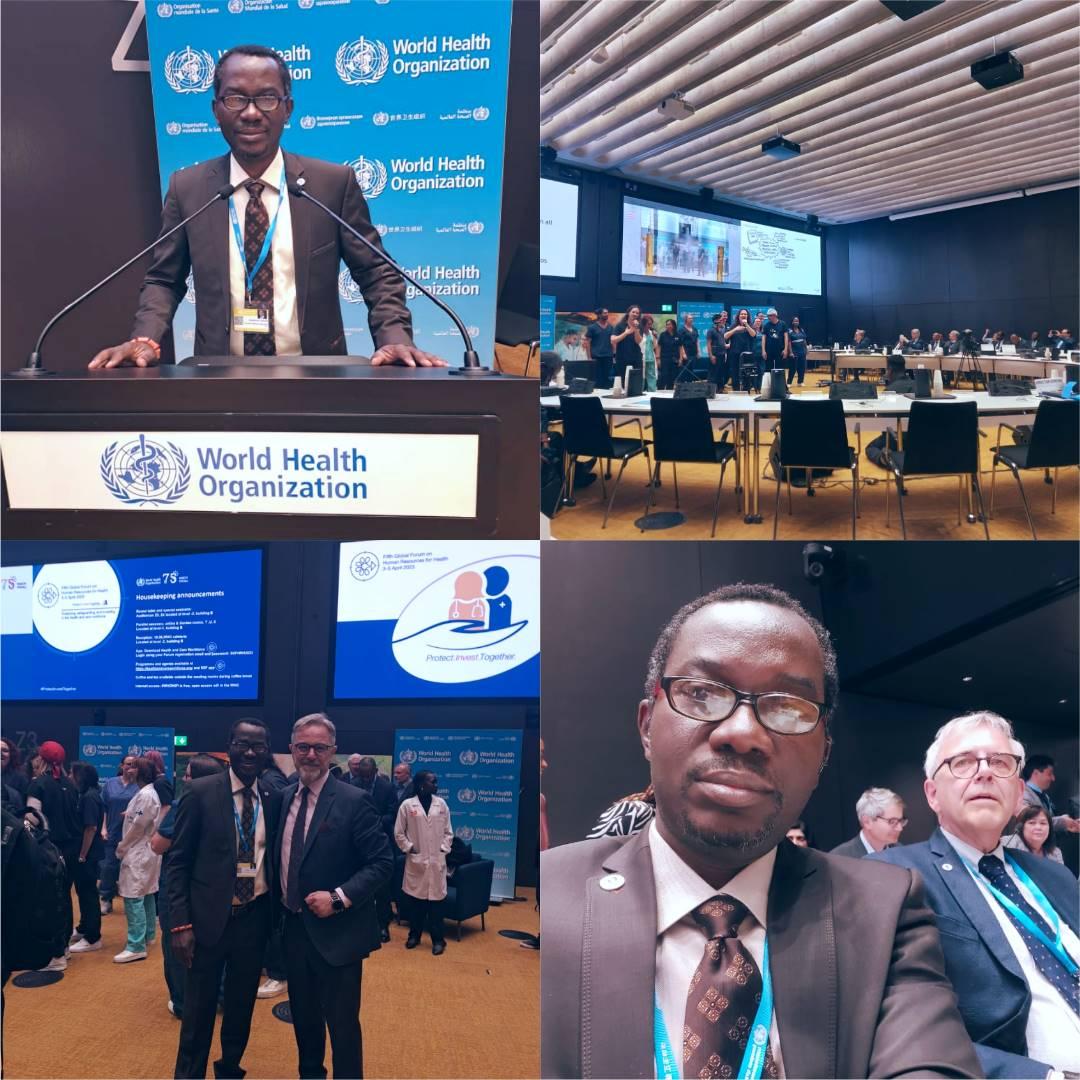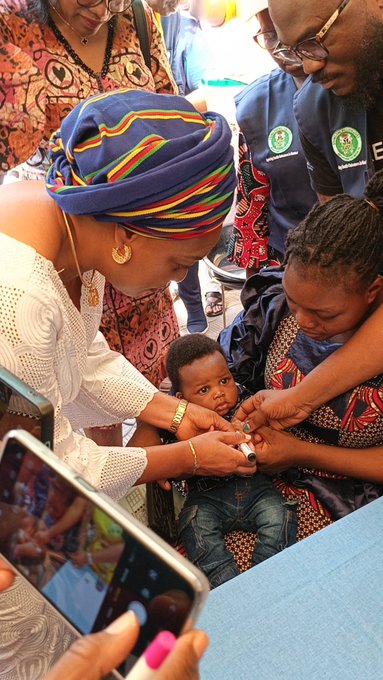Health
WMA President Calls For Quick Address Of Mental Health, Burn Out In Health Sector

The WMA President, Dr.Osahon Enabulele, has called on governments and managers of health systems to quickly resolve the mental health, burn out, and psycho-social challenges currently being faced by physicians and other health professionals in various parts of the world.
The WMA President stated this while speaking at two different sessions of the recently concluded 5th Global Forum on Human Resource for Health organized in Geneva by the World Health Organization from April 3-5, 2023.
The first session in which the WMA President spoke had as its theme:”the impact of COVID-19 on the health workforce–the past, present, and future,” while the theme of the 2nd session was: “Protecting the rights of health and care workers in times of pandemics and beyond: How to move from technical guidance to effective regulation.”
Highlighting the challenges faced by physicians and other health professionals across the world, Dr.Enabulele particularly decried the huge impact of the Covid-19 pandemic and health system challenges on the mental health and psycho-social state of the health workforce, and the inability of governments and managers of health systems to concretely and altruistically address the challenge which he traced to apprehension over inadequate supplies of personal protective equipment with the attendant fear of increased exposure to risk, violence against them, the stressful work routine, the crisis of brain drain and increased work load, with resultant increase in burn-out of the health workforce, and increased exit from the health professions.
While calling for provision of equitable access to mental and psycho-social care services to victims of the disabling working conditions, Dr.Enabulele, charged governments and managers of health systems to altruistically address the inequity in health workforce distribution, and to show greater political commitment to prioritized investments in the well-being, rights, safety and working conditions of the health workforce, comprehensive legal framework to protect the rights of the health workforce and reduce the incidence of violence against them, as well as strengthening the provisions for the health workforce in the evolving draft of the pandemic treaty, amongst other recommendations he articulately projected during the sessions held respectively on Monday, April 3, 2023.
Earlier in his welcome remarks, the WHO Director General,Dr Tedros Adnanom Ghebreyesus, welcomed all participants to the global forum and called for useful suggestions to help resolve the challenges of the health workforce.
He assured that the WHO will accord greater attention to the issues of the health workforce to aid the attainment of Universal Health Coverage.
The 5th Global Forum on Human Resource for Health had in attendance the Director General of the World Health Organization, Dr.Tedros Adhanom Ghebreyesus, Member states of the WHO, Health Ministers of various countries, the International Labour Organization, Health Professional Associations such as the World Medical Association, Global funding agencies, as well as many other stakeholders.
The Global Forum ended with a colourful closing ceremony on Wednesday, April 5, 2023, with closing remarks delivered by the WHO Director General.
Health
LASG FLags Off Polio Outbreak Response Campaign

The Lagos State Government, through the Lagos State Primary Health Care Board, has launched the 2025 Polio Outbreak Response Campaign, reaffirming its commitment to eradicating polio and safeguarding the health of its children.
The ceremony, held at the Simpson Primary Healthcare Centre, was led by the First Lady of Lagos State, Dr. (Mrs.) Claudiana Ibijoke Sanwo-Olu, represented by Mrs. Widad Jumoke Mustafa, a member of the Committee of Wives of Lagos State Officials (COWLSO).
In her address, the First Lady emphasised the state government’s proactive measures to keep Lagos polio-free, highlighting the critical importance of the campaign in preventing the debilitating effects of poliomyelitis, which can result in paralysis or death.
READ ALSO: IMPEACHMENT: Lagos Ex-Speaker, Obasa’s ‘Sins’ Revealed
The First Lady also called on parents, community leaders, and stakeholders to support the campaign by ensuring eligible children are vaccinated.
Targeting children aged 0-59 months, vaccination teams will administer the Oral Polio Vaccine (OPV) to prevent virus transmission.
Dr. Kemi Ogunyemi, the Special Adviser on Health, expressed gratitude to Lagosians for their continued cooperation in the fight against polio. While appreciating all healthcare workers and partners for their services, Mrs. Ogunyemi encouraged parents to present their children and wards for the exercise.
Also speaking, the Chairman of Lagos Mainland Local Government, Mrs. Omolola Rashidat Essien opined that Immunization is key in ensuring that children are kept safe from polio and other vaccine preventable diseases.
Dr. Abimbola Bowale, the Supervising Permanent Secretary, Lagos State Primary Health Care Board, who also spoke at the event, underscored the life-saving importance of immunization.
“All children aged 0-59 months need multiple doses of the polio vaccine to ensure full protection. Any child missed represents a potential risk for the poliovirus to spread. The vaccine is safe, effective, and crucial in keeping our communities polio-free,” he stated.
Dr. Bowale also outlined several strategies to ensure the success of the campaign, including fixed post teams stationed at primary healthcare centres and public health facilities, house-to-house visits, and a transit strategy to reach special locations such as places of worship, schools, motor parks, and other public venues.
The event concluded with Dr. (Mrs.) Claudiana Ibijoke Sanwo-Olu officially launched the campaign, marking a renewed effort to maintain Lagos State’s polio-free status.
Headline
Lagos Cholera Cases Rise To 421

The Lagos state suspected cholera cases have risen to 421.
The Commissioner for Health, Akin Abayomi disclosed this on his Instagram handle @profakinabayomi on Saturday.
“As of June 20, 2024, an additional four suspected cholera cases have been reported, as illustrated in the accompanying graph,” he wrote.
He noted that the Emergency Operations Centre in collaboration with all relevant partners is actively engaged in contact tracing, community-based surveillance, awareness campaigns, sample testing, and ensuring that confirmed cholera cases receive appropriate medical treatment.
READ ALSO: Two Suspects Arrested For Stealing Car From Mosque During Juma’at Prayer
On Friday, the commissioner confirmed 35 cases out of the 417 suspected cases and 24 deaths across 20 Local Government Areas in the state.
The cases were reported from Agege, Badagry, Ikeja, Mushin, Ajeromi-Ifelofun, Epe, Ikorodu, Ojo, Alimosho, and Eti-Osa.
Others were Kosofe, Oshodi-Isolo, Amuwo-Odofin, Ibeju-Lekki, Lagos Island, Shomolu, Apapa, Ifako-Ijaiye, Lagos mainland, and Surulere.
Cholera is a food and water-borne disease caused by ingesting the bacteria— Vibrio cholerae — in contaminated water and food. Cholera can cause severe acute watery diarrhoea, and the severe forms of the disease can kill within hours if left untreated.
In Nigeria, cholera is an endemic and seasonal disease, occurring annually mostly during the rainy season and more frequently in areas with poor sanitation.
READ ALSO: Police Arrest 28yr Old Suspected Cultists, Recover Gun In Delta Community
The World Health Organisation on Thursday announced a spike in cholera in several regions of the world, with almost 195,000 cases and over 1,900 deaths reported in 24 countries since the start of 2024.
WHO said the Eastern Mediterranean Region reported the highest number of cases, followed by the African Region, the Region of the Americas, the Southeast Asia Region, and the European Region.
The global health body, however, noted that there are no reported cases in the Western Region, according to its bulletin released on Wednesday.
It said it exhausted its global stockpile of Oral Cholera Vaccines by March but was able to exceed “the emergency target of five million doses in early June for the first time in 2024.”
Health
AUTISM: What You Need To Know

By Silver Yeibake
Autism, commonly known as Autism Spectrum Disorder (ASD), is a neurodevelopmental disorder that affects communication, social interaction, and behavior. Autism is referred to as a spectrum condition since it can manifest in a variety of symptoms and abilities. While the actual cause of autism is unknown, evidence suggests that genetic and environmental factors interact to influence its development.
The risk factors include a sibling with autism, advanced age of parents, exposure to certain air pollutants and pesticides before birth, extreme prematurity, mothers with diabetes, immune system disorders or obesity, any difficulty with delivery leading to deprivation of oxygen to the baby’s brain, fever during pregnancy, lack of certain vitamins minerals during pregnancy, and certain genetic conditions, such as Down, fragile X, and Rett syndromes.
“Risk factors can not on their own cause a disease. However, they can increase the likelihood of that disease in a person.”
It is important to know that contrary to trending claims online, there is no scientific or medical evidence that vaccines or consumption of sugar are risk factors for autism.
READ ALSO: Kidney Stones: What You Need To Know
Autism is defined by difficulties in social interaction and communication. Individuals with autism may struggle to grasp social cues, maintain eye contact, and engage in typical back-and-forth conversations. Some people may also engage in meaningless, repetitive actions, such as hand-flapping or rocking, and have strong interests in specific areas.
It is essential to remember that autism is a lifelong diagnosis, but with early intervention and adequate care, people with autism can live fulfilling lives.
Autism treatment frequently includes behavioral therapy, speech therapy, occupational therapy, and social skills training. Each individual with autism is unique, thus interventions should be tailored to meet their personal needs and strengths.
In spite of the difficulties that autism can cause, many people with autism possess unique talents and abilities. Some people may succeed in fields such as music, art, mathematics, or programming, thus it is important for society to acknowledge and honor the qualities and achievements of people with autism.
In summary, autism is a complicated and diverse disorder that affects individuals in various ways. By raising autism knowledge, understanding, and acceptance, we can build a more inclusive society in which people with autism can thrive and attain their full potential.
Dr. Yeibake, Weriwoyingipre Silver.
Senior Registrar,
Faculty Of Pediatrics,
WACP

 Politics5 days ago
Politics5 days agoJUST IN: INEC Excludes PDP From Ekiti Governorship Election

 Metro4 days ago
Metro4 days agoJUST IN: Court Orders Remand Of Ex-AGF Malami, Son, Wife In Kuje Prison

 News5 days ago
News5 days agoNigerian Army Finally Reveals Details Of US Military-led Airstrikes In Sokoto

 Politics4 days ago
Politics4 days agoDino Melaye Reacts To Malami’s Arraignment For Money Laundering

 News4 days ago
News4 days agoOPINION: Don Pedro And Beautiful Benin

 Business5 days ago
Business5 days agoJUST IN: Otedola Sells Shares In Geregu Power For N1trn

 News5 days ago
News5 days agoOutrage, Confusion Trail Rumours Of Mohbad’s Wife Giving Birth Two Years After His Death

 Sports5 days ago
Sports5 days agoAFCON 2025: Four Teams Qualify For Round Of 16

 Metro5 days ago
Metro5 days agoThree Suspects Lynched As Mob Burns NSCDC Outpost In Kano

 Metro5 days ago
Metro5 days agoMoment Nigerians Rescued Anthony Joshua After Accident On Lagos–Ibadan Expressway [VIDEO]






























